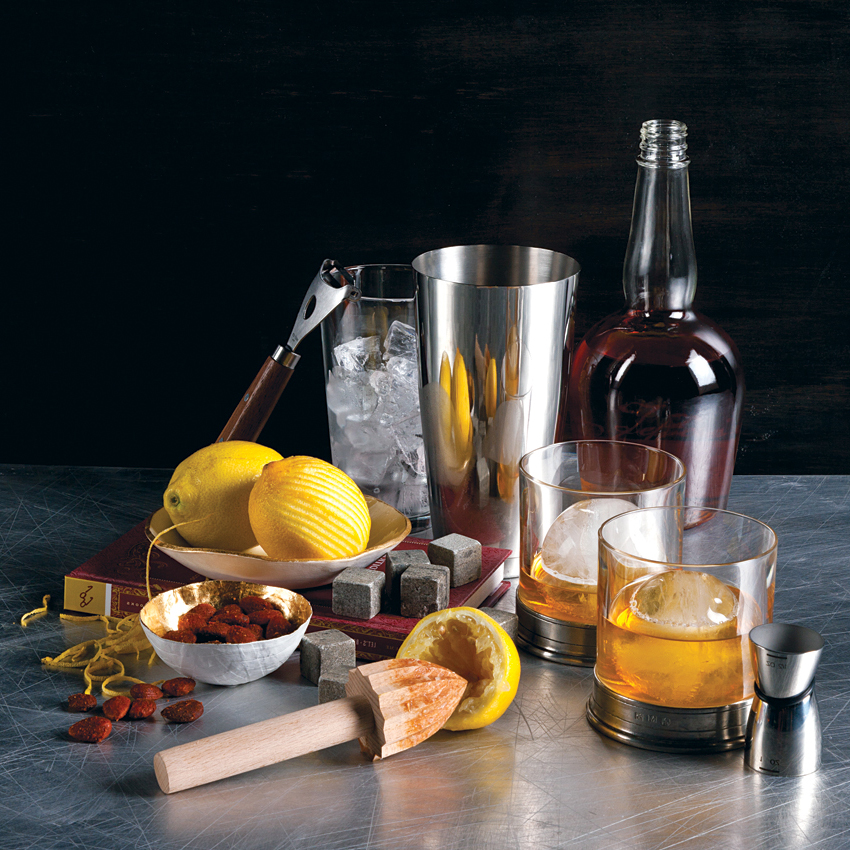Expert Advice

From left, Let’s Bring Back: The Cocktail Edition, $19, Trident Booksellers and Café; gold-paper bowl, $24, and gold-lip dish, $34, both upintheairsomewhere.com; whiskey stones in soapstone, $20 for nine, teroforma.com; wood citrus reamer, $4, Crate & Barrel; weighted shaker, $14.50, the Boston Shaker; Match pewter double old-fashioned glasses, $71 each, Didriks; jigger, $7, Crate & Barrel. (Photograph by Dave Bradley. Food Styling by Rowena Day. Prop Styling by Lauren Niles.)
Mix Like a Master
Brother Cleve is Boston’s undisputed master of the vintage cocktail, having helped numerous local establishments refine their cocktail menus and develop signature drinks. Of course, this libation expert and musician also has a killer home bar, with more than 50 bottles of unique tinctures. Here, Cleve shares the ingredients you’ll need to create your own cocktail mecca.
SPIRITS & LIQUEURS
Black Maple Hill Distillery makes a superb 16-year-old bourbon. For a drier mix, Cleve recommends Whistle Pig rye. When it comes to vodka, Cleve prefers the relative newcomers to the big names—American Harvest, an organic winter-wheat vodka from Oregon, or Zyr, a real Russian vodka. He enjoys American gin brands like Grand Ten Distilling’s Wire Works, from South Boston, and Bluecoat Gin, from Pennsylvania. For a perfect planter’s punch, Cleve keeps a 21-year-old Appleton Estate bottle around the house. His liqueurs of choice include Cointreau triple sec; Pierre Ferrand Dry Curaçao; Merlet creme de cassis; Rothman & Winter apricot, crème de violette, and peach; and Dolin Vermouth de Chambéry for martinis.
GLASSES
Every bar needs a set of stemmed and rocks glasses, and Cleve suggests keeping several kinds around for special occasions. “It’s like wearing different shoes—it breaks it up so you don’t need to use all the same glassware all the time,” he says. Stemmed glassware is used for stirred drinks without ice: Rather than classic martini-style glasses, go with the Leopold Coupe variety (they’re rounded at the top, which helps prevent spills), or elegant Nick and Nora glasses, which are perfect for sidecars and drinks with a sugared rim. Rocks glasses are for more-robust cocktails served with ice—Cleve prefers the platinum-band double old-fashioned by Riedel.
GADGETS
When shaking his concoctions, Cleve uses the Professional Boston Shaker, a set that comes with a brushed-steel cup and a pint glass. Once the metal gets cold, he knows the drink is ready to serve. He stirs up Manhattans and martinis in a Yarai pitcher—made in Japan, it’s both elegant and durable, and has a spill-resistant pouring spout. For mojitos and other drinks with crushed fruit, try Über Bar Tools’ Pro Crush Muddler, which, when turned upside down, can also be used as an ice crusher. And if you want to mix any cocktail properly, you’ll want to get yourself a jigger. “It’s like when cooks follow a recipe and use measuring cups—they don’t just throw a handful of flour in,” says Cleve, who recommends the OXO SoftWorks stainless steel double jigger.
PRO FINISH
Cleve favors Tovolo ice cube trays, which come in a range of sizes, but to really dress up a pour, he goes with Drinksology’s Ice Ball Maker, which carves cubes into spheres. “They definitely make for a good conversation piece,” Cleve says. And if you prefer crushed ice? All you’ll need is a classic canvas Lewis Bag and a mallet.
Insider Tip
Avoid the red-dyed cherries found at most bars and instead opt for the Marasca cherries by Luxardo Gourmet, which are soaked in their own juice.
Get It!
Yarai mixing glass, $60, Williams-Sonoma.

Photograph by Alex Gagne


